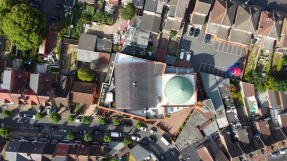New Zealand church leaders urge political parties to tackle poverty
The General Election date was set this week by Prime Minister Helen Clark for Saturday 8 November.
"As made clear in our joint Church leaders' statement in March we believe that issues related to poverty, families and children, older people, housing and essential social services are issues that individual politicians need to take personal leadership on," said Archbishop David Moxon of the Anglican Church.
"There is also a clear expectation that they offer the voting public something significant to say on these issues, that can then be part of a process of a honest and open debate."
The Rev Brian Turner of the Methodist Church, Rodney Macann of the Baptist Churches of New Zealand, and the Rt Rev Pamela Tankersley, of the Presbyterian Church, all described the period before an election as a unique opportunity to intensify discussion about the type of society we live in.
"The effect that poverty has on vulnerable New Zealanders is an issue we need to bring to the fore as part of the call we have as Christians to serve those on the margins of society," said Rev Tankersley.
"A question that we need to ask ourselves is whether we are striving hard enough as a nation to put aside self-interest and to find a stronger collective social conscience in 2008," said Brian Turner.
"When our politicians talk about the policies they plan to introduce we want them to talk about the extent to which those policies can be considered just and compassionate, and we want them to explicitly address the issue of reducing poverty," said Macann.
The Catholic Church of New Zealand will hold its annual Social Justice Week next week with a focus on the latest publication from Caritas, the Catholic social justice agency, entitled 'Look and look again: Poverty in an affluent society'.
Archbishop John Dew of Wellington said, "As made clear in the recent statement by Catholic Bishops we are not about to tell people how to vote, but the way in which individual politicians respond to social justice issues, particularly poverty, is obviously an important signal of their integrity and values."
Garth McKenzie, Salvation Army Commissioner, said that any investment in addressing poverty in Aotearoa New Zealand is a "socially responsible investment".
The Salvation Army in New Zealand has published a number of reflections for this year's election in its publication 'A New Journey', in which it argues that all of society needs to have a concern about the structures which marginalise people and leave them in poverty.
"The message we have for our would-be leaders is that we need to do more as a nation to look for ways of building just structures - locally, nationally and even globally," said McKenzie.
Earlier this year the Church leaders also endorsed the Council's information programme titled 'Aroha tetahi ki tetahi - Let us look after each other'. The programme aims to raise public awareness of social justice and compassion issues and to ensure that the situation of the poor and vulnerable in Aotearoa New Zealand is given a more prominent place on the agenda of public concerns in 2008.
Through the programme thousands of posters and brochures, promoting themes such as treasuring our children and valuing older people, have been distributed to Churches and providers of essential social services throughout New Zealand.
The five "calls" made by the programme are for a more just and compassionate society through the implementation of policies to utilise prosperity to eliminate poverty, support families and communites to nurture and protect children, provide older people with a range of choices for their homes, support and lifestyle, enable access to good, affordable housing for everyone, and support community-based partnership-driven solutions to social issues in the community.













